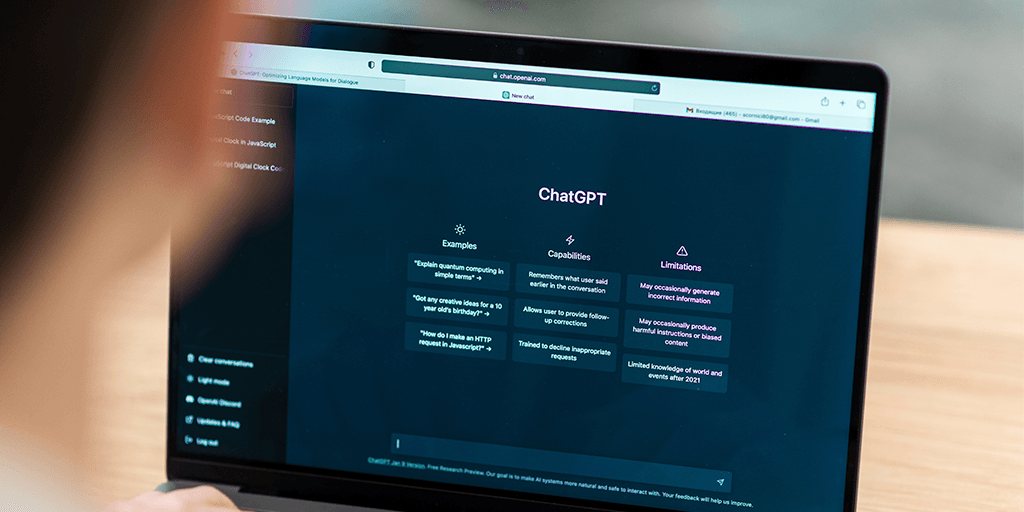
–Working with ChatGPT | Image by frimufilms
Since its release last November, ChatGPT, a large language model and brainchild of OpenAI, has become a social sensation. People have been captivated by a deluge of videos, podcasts, and articles that explore how this new technology works and how it may potentially displace jobs. While many people were excited and marveled at their first experience with this conversational chatbot, the more they used it, the more fear and panic they felt.
But why has ChatGPT impacted us so profoundly? Why do technicians, entrepreneurs, and bloggers unanimously bear such a positive attitude towards the capabilities of this new technology, while ordinary people are terrified that computers will soon edge them out of their livelihoods?
Firstly, let’s explore what ChatGPT is and how it interacts with humans. According to research documents released by OpenAI, this technology is essentially a large language model, or a chatbot that functions in a dialogue format. We can think of ChatGPT as a “well-informed person” who has studied almost everything on the internet. Whenever you have a question, you can feed it into the prompt, and ChatGPT will provide a detailed response almost instantly.
Now, let’s examine the tasks that ChatGPT can perform and how well it performs them.
Efficiency in Information Retrieval
Information retrieval is an ubiquitous task that we perform every day, driven by our innate desire to acquire knowledge and find answers. We employ a range of methods to carry out this task, including search engines, textbooks, and consulting with others, and now we have ChatGPT as a new option. However, there is a marked difference in efficiency between these various methods when it comes to achieving the same result.
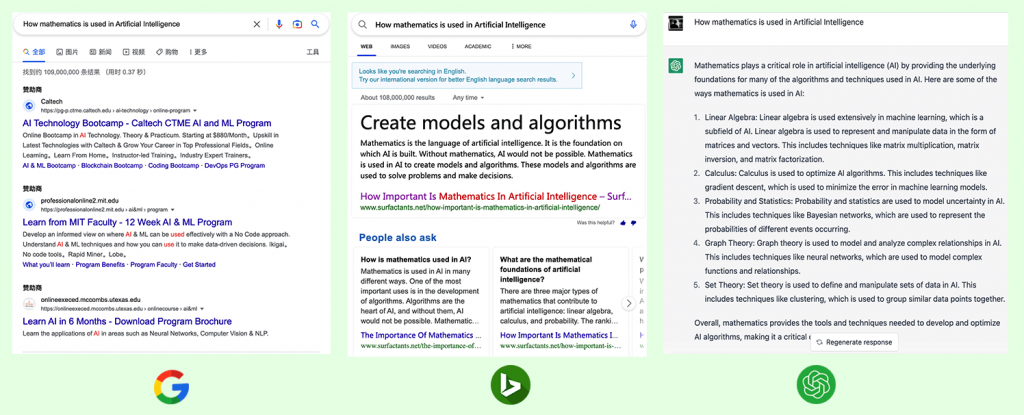
–Responses from the prompt-How mathematics is used in Aritificial Intelligence? | Image by The Alphabet
The image posted above showcases the results of an experiment in which I tested Google, Bing, and ChatGPT by asking the same question: How is mathematics used in Artificial Intelligence?
As we can observe, the feedback varies from a general list of potential websites provided by Google, to a relatively concise answer with alternative links following behind by Bing, to a detailed and structured response provided by ChatGPT.
In terms of efficiency, ChatGPT outperforms the other two search engines by presenting a formatted and comprehensive conclusion that satisfies the user’s query. Google users have to invest a significant amount of time sifting through links and reading them carefully to arrive at a conclusion. Bing users may face a similar situation since the response provided is too simple and does not offer much in-depth information. ChatGPT saves the user’s time by skipping the process of information filtering and going straight to the answer. Furthermore, the answer provided by ChatGPT is elaborative, breaking down the abstract concept of mathematics into five subcategories and explaining how each field contributes to Artificial Intelligence and the techniques used.
Logic in Conversations
Conversations occur every day and in all kinds of settings: small talk between friends, family discussions between parents and children, and serious business negotiations between partners, among others. It is easy to understand how conversations progress: one person initiates a conversation, and the other responds; this cycle continues until the conversation concludes. We can roughly equate conversations to the sum of numerous information retrieval cycles, with one addition: logic.
Before delving into this topic, let’s conduct some experiments.
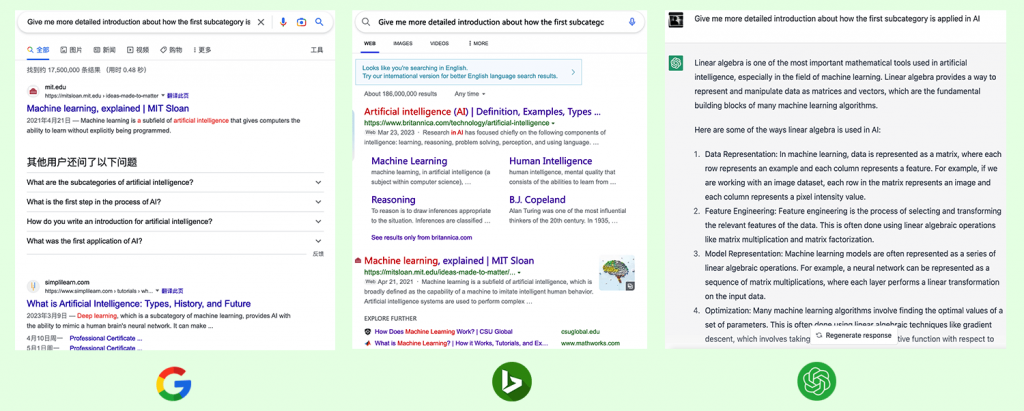
–Responses from the prompt—Give me more detailed introduction about how the first subcategory is applied in AI | Image by The Alphabet
I submitted a follow-up question – “Give me more detailed introduction about how the first subcategory is applied in AI?” – in order to simulate how these tools would interact with us in a conversation. It is easy to spot the difference between the responses of Google and Bing compared to ChatGPT. Google and Bing both forget the details of our previous communication, which makes it difficult for them to understand the implicit logic behind my use of the term “first subcategory” in my new question. These search engines are not designed to comprehend and reason out the context and meaning of different inquiries. However, ChatGPT can easily decode such logical implications, as you can see from the result posted above.
To test if ChatGPT can handle more complex conversations, I asked it another question – “Are any other branches you missed to mention when you listed the ways mathematics are used in AI?” – to pick up where we left off in our first prompt.
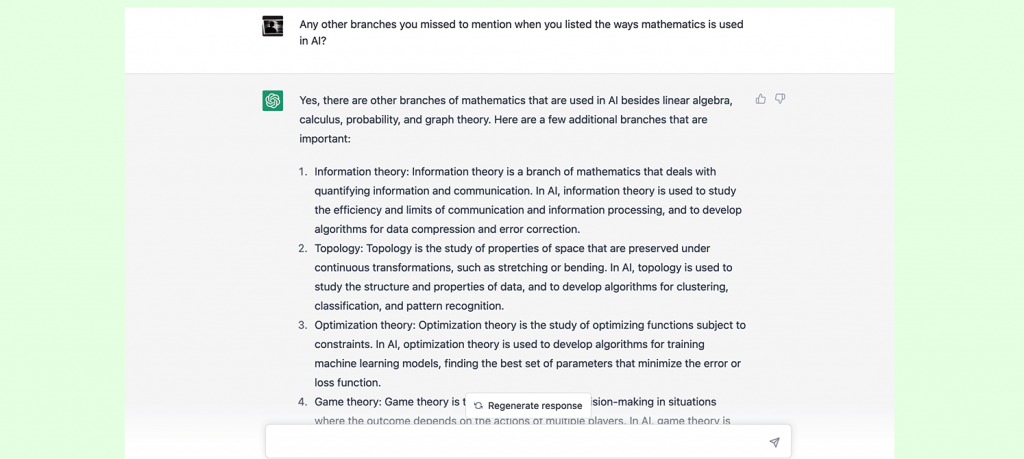
–Response from the prompt—Any other branches you missed to mention when you listed the ways mathematics is used in AI? | Image by The Alphabet
ChatGPT “knows” the user’s intention is to continue this conversation by going back to the previous topic, and updates its output in just seconds. It outperforms the majority of people and even some professionals in AI. As long as users intend to continue the conversation, they can do so indefinitely.
Limitations in Judgement
Is ChatGPT truly omnipotent? Is it reasonable for us to choose ChatGPT over traditional search engines for information retrieval? Is it safe to assume that conversing with ChatGPT would be as smooth as conversing with a real person? It would be too presumptuous to answer ‘yes’ to all of these questions.
As we discussed earlier, ChatGPT has a great advantage in retrieval efficiency over Google and Bing. However, it is important to consider the speed of the system with caution since efficiency is only valuable if ChatGPT’s accuracy is guaranteed.
Search engines provide potential candidates – webpages that can help us solve our problems – when we submit our request to the search window. Then, we as users have to spend a significant amount of time sifting through those promising web links to read them thoroughly and determine the answer to our question. In other words, it is the users who determine what is right or wrong, while the search engines are not able to make that decision for us.
On the other hand, ChatGPT returns the ultimate answer to users after we initiate a request in the chatbot. It promotes user efficiency by saving us from enduring the aforementioned intricacies of digesting tons of information and then evaluating what’s right and wrong.
That’s why I argue that users should raise the alarm when we enjoy the pros of efficiency enhancement. We are prone to take ChatGPT’s answer for granted and leave the virtue of judgment, the most essential trait for a human being, in the hands of ChatGPT. The irony lies in the fact that most people don’t appreciate, at least for now, how this state-of-the-art technology processes information to reach its conclusion.
Lacking in Flexibility
Having conversations with ChatGPT, as we noted before, will go smoothly, given that the users provide sufficient background information or context regarding a specific question since it works skillfully at integrating all the information and then advancing the conversation logically. However, it is this very practice of rigor that retards a sense of naturalness and rationality that we would like ChatGPT to embody when the questioner switches the topic abruptly to something that has nothing to do with the previous conversation.
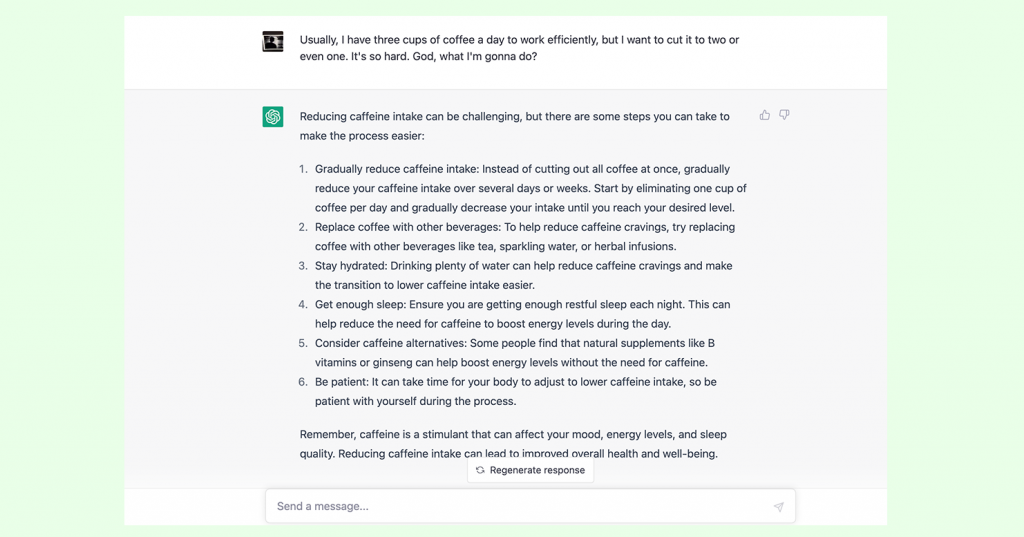
–Response from the prompt—A new question regarding drinking coffee | Image by The Alphabet
This time, I changed my prompt deliberately to a topic unrelated to AI and mathematics, specifically about drinking coffee. As you noted, ChatGPT was able to provide some “useful steps” immediately despite the sudden change in topic. However, if this conversation were to happen with a human being, their reaction might be different.
Human beings often rely on context and previous conversation to guide their responses, and sudden changes in topic can catch them off guard. They may need some time to process the new information and adjust their thinking, which can cause confusion and delay in the conversation.
That being said, humans also have the advantage of being able to use intuition and empathy to understand the underlying intention and emotions behind a conversation. They can pick up on subtle cues such as tone of voice, facial expressions, and body language to better understand the other person’s perspective and respond accordingly.
In contrast, ChatGPT is limited to processing text-based inputs and may struggle to understand nuances and emotions in a conversation. While it can provide quick and accurate answers to specific questions, it may not be able to fully replicate the natural and fluid conversation that humans are capable of.



